The U.S Food and Drug Administration (FDA) has approved the first blood-based genetic test designed to detect mutations in the epidermal growth factor receptor (EGFR) gene in non-small cell lung cancer (NSCLC) patients.
Lung cancer, of which NSCLC is the most common type, is the leading cause of cancer-related death in the U.S. Although other mutations have been linked with the development of NSCLC, approximately 10% of the patients with the disease have tumor-associated EGFR mutations.
Tarceva therapy has been FDA approved for patients with locally advanced or metastatic NSCLC after at least one prior chemotherapy regimen and as a first-line treatment for metastatic NSCLC patients with specific mutations in the EGFR gene – such as exon 19 deletion or the substitution of the amino acid leucine in the position 858 for an arginine.
Roche Molecular Systems developed the cobas EGFR Mutation Test v2 because NSCLC tumors can scatter DNA from tumor cells into the patient’s blood. The test which uses the patients’ blood to detect the specific mutations.
The test is an expanded version of the cobas EGFR Mutation Test with higher mutation coverage and the ability to detect these mutations in blood samples. It may not only benefit patients who are too weak or or otherwise unable to provide a tumor sample for analysis, it also helps identify patients who may benefit from treatment with Tarceva.
“Approvals of liquid biopsy tests make it possible to deliver highly individualized health care for patients,” said Alberto Gutierrez, director of the Office of In Vitro Diagnostics and Radiological Health in the FDA’s Center for Devices and Radiological Health, in a press release. “Liquid biopsies also have the potential to allow physicians to identify patients whose tumors have specific mutations in the least invasive way possible.”
The efficacy of the test was determined with samples from patients enrolled in a clinical trial who had been previously confirmed to bear the exon 19 deletion or L858R mutation through tumor biopsies analysis. If mutations are not detected in the patients blood samples, a tumor biopsy is required to determine whether other NSCLC-causing mutations are present.

